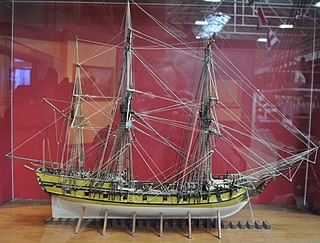Ten ships of the Royal Navy have been named HMS Rattlesnake, including:

The Royal Navy (RN) is the United Kingdom's naval warfare force. Although warships were used by the English kings from the early medieval period, the first major maritime engagements were fought in the Hundred Years War against the Kingdom of France. The modern Royal Navy traces its origins to the early 16th century; the oldest of the UK's armed services, it is known as the Senior Service.
- HMS Rattlesnake (1777), a 14-gun cutter launched 1777, later re-classified as a sloop, and lost in 1781.
- HMS Rattlesnake (1783), ex-Rattlesnake U.S. privateer, ex-Cormorant of 1781. A 12-gun brig. The Algerine Navy and the Dey of Algiers detained her for five days in November 1784. Sold 1786.
- HMS Rattlesnake (1791), a 16-gun sloop in service from 1791 until sold in 1814.
- HMS Rattlesnake (1814), was a brig of 14 guns that the United States Navy purchased in 1813. The Royal Navy captured her in 1814 and the last extant records report that the Navy had purchased her. Her subsequent fate is currently unknown.
- HMS Rattlesnake (1822), a 28-gun frigate launched in 1822.
- HMS Rattlesnake (1861), a 21-gun Jason-class corvette launched in 1861 and broken up in 1882.
- HMS Rattlesnake (1886), a torpedo gunboat in service from 1886 to 1910.
- HMS Rattlesnake (1910), a Beagle-classdestroyer launched in 1910 and sold in 1921.
- HMS Rattlesnake (1943), an Algerine-class minesweeper. Pennant J.297, M.297. Launched 23/2/1943. Scrapped at Brunton, Grangemouth, October 1959.

HMS Cormorant was probably launched in 1780 at Plymouth, Massachusetts. She was commissioned as the Massachusetts privateer Rattlesnake in 1781. The Royal Navy captured her shortly after she set out on a cruise and purchased her. In November 1781 she carried to England the first news of General Cornwallis's defeat. The Royal Navy registered her under the name Cormorant. In 1783 the navy renamed her Rattlesnake. It paid her off and sold her in 1786.
USS Rattlesnake was the brig Rambler built in Medford, Massachusetts, in 1812 that the United States Navy purchased in July 1813. Rattlesnake captured numerous British merchant vessels before HMS Leander captured her in mid-1814. The Royal Navy apparently purchased her at Nova Scotia, but there is no record of her subsequent career.

HMS Rattlesnake was an Atholl-class 28-gun sixth-rate corvette of the Royal Navy launched in 1822. She made a historic voyage of discovery to the Cape York and Torres Strait areas of northern Australia.

